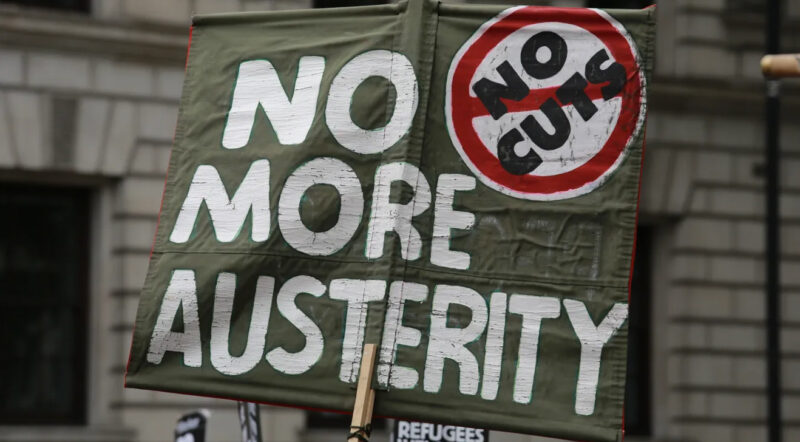“No one’s talking about a general strike”
There is a serious debate going on within the movement about how to beat the cuts, write Jeremy Drinkall and Richard Brenner. Different strategies are being proposed but there is one thing that the TUC and Tories certainly agree on – nobody is talking about a general strike (or are they?)
The Tories’ anti-union minister, Francis Maude, told the nation in December that, conveniently for the coalition, “No one is talking about a general strike.”
This odd remark was echoed by TUC head Brendan Barber less than one month later. Coming out of the TUC’s January meeting to ‘discuss’ coordinated action, Barber walked straight up to the assembled cameras and the first thing he said was: “No one was talking about a general strike.”

Then last month the Tories’ Daily Mail rag revealed “a secret ‘war plan’ to prevent a general strike has been drawn up by ministers … a unit has been set up in the Cabinet Office to prevent Britain grinding to a standstill in the event of mass public sector walkouts. Officials have conducted ‘war games’ to ensure that strike breakers are available to run vital facilities…”
No surprises for guessing that this special unit for talking about a general strike is chaired by…Francis Maude.
It seems while the Tories want to stop trade unionists talking about a general strike, they themselves are talking about it constantly.
This is because they know full well that an all-out indefinite general strike is the one thing that can wreck their plans, beat their cuts and bring down their illegitimate government.
Don’t we need some national disputes before we can get a general strike?
There are already national disputes – look at pensions, the lecturers and teachers, and the wave of disputes in local authorities up and down the country. The key is to turn them into indefinite strikes that can really pile on the pressure, not just one day actions.
If a strong union leads the way with a national all-out strike, it could inspire others to follow behind them. The fight for solidarity could develop into a movement for a general strike.
But it can work the other way round, too. Some sections of workers can be worried about going out on a limb, especially given the anti-union laws.
A massive campaign across the country for a general strike would encourage workers to take action, because it would raise the prospect of solidarity – and the possibility of winning.
Because one thing is clear: a strike by one union or one sector alone could be beaten – but an indefinite general strike could bust the anti-union laws and bring down the Tories.
Why not simply call for coordinated strikes, as the TUC Congress did?
It sounds like a simple legal alternative to a general strike, but this ‘coordination’ strategy has another obvious weakness.
If a set of strikes is legal, then each of them must be a trades dispute with an employer over pay or conditions, not a solidarity action or political strike.
So if a series of legal trades disputes take place at the same time, all the bosses and the government need to do is decide to settle one of them. It may cost them a few million, but it takes a key battalion off the battlefield.
This is what Thatcher did in 1984 when she settled with the dockers to let the miners fight on alone.
The same thing happened in November last year, when the BBC, London Fire Brigade and the tube were due to walk out, but the FBU called off their action for “talks” which led nowhere.
In other words, coordinated strikes can become uncoordinated as soon as one employer makes the slightest concession. That’s why a general strike – all for one and one for all – is so much more powerful.
Why call on the TUC to do something they won’t do?
It is completely untrue that a moderate-led TUC will never call a general strike. They will – if they are put under so much pressure that they have to either call it, or lose control of the movement. That’s what happened in 1926 when they called a general strike, and in 1972 when they threatened to call one, forcing Heath to back down on his anti-union laws.
Second, why should we let them off the hook? The Tories don’t want them to call a general strike. Nor does Clegg or Ed Miliband. Why go along with this agreement? These people are the leaders of seven million workers – they should do their jobs and organise action.
As for creating illusions, this fine idea assumes that the illusions aren’t already there. But for every excellent militant who sees that the TUC moderates will sell us out, there are 500 union members who want action but haven’t yet lost faith in the union officials. A skillful militant will help them to find out by calling on the leaders to act, and then showing them in practice that trusted leaders can fall short of their hopes and expectations.
Didn’t the general strikes in Greece and France fail?
Yes, they did, because the union leaders refused calls to turn one-day protests into an indefinite general strike. If they had, they could have won their demands and brought down their governments.
But if the TUC lead it, they’ll sell it out!
That’s why we need to work overtime now to build unofficial structures that can build for a general strike, control and coordinate action when it happens, warn that the TUC could sell it out like they did after nine days in 1926, and continue the action if Barber tries to do the same.
The best way towards this is to build the anticuts committees as large as possible, drawing in as many delegates as we can, from every workplace, every estate and tenants’ group, every campaign, every local trades council, trade union, Labour, student and socialist group. That way we can create something like the councils of action that spread across the country in the 1920s, real councils of working class delegates that can take control of the movement from below.
What about the anti-union laws?
The government would take a huge risk if it dragged the all the unions through the courts. For a start there are not enough courts or jails to prosecute and punish us all. And they can’t run the country without us. Total defiance makes the law impotent, as the unions showed in 1974 and as we showed in the great anti-poll tax movement.
Well I’d love to see a general strike but it’s just not going to happen…
Then why are the Tories busy telling us no one is talking about it? Why are they preparing a unit to stop it or crush it? This argument sounds very “realistic” but has been influenced, even without realising it, by the very message the bosses and Barber want us to believe.
The bosses are not wrong to worry about a general strike. Times of global crisis are typically times of revolution, and the capitalists know it very well. We should too.






